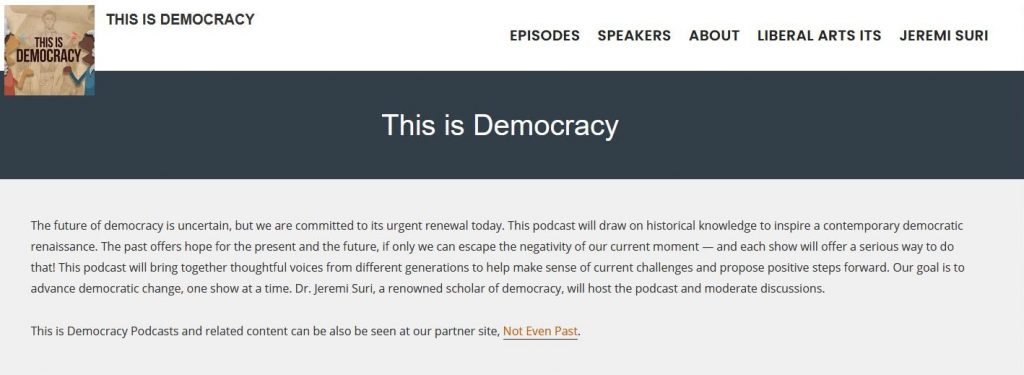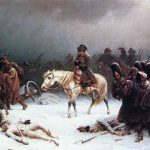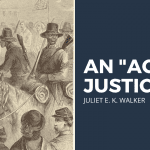
Not Even Past is proud to partner with This is Democracy, a groundbreaking podcast that brings together thoughtful voices from different generations to help make sense of current challenges and propose positive steps forward. This is Democracy Reading Lists are designed to accompany the podcast interview and to provide additional, curated readings for anyone interested in the topic under discussion.
For Episode 121 of This is Democracy, Jeremi and Zachary Suri hosted Dr. Susan Neiman to discuss the role of historical memory in addressing past injustices.

We tend to assume that the crimes of the Nazis were so awful, that the minute the war was over, they fell on their knees and begged for atonement. That is not what happened at all. In West Germany, in particular, they thought of themselves as the world’s worst victims…And I suddenly realized they sound just like the defenders of the Lost Cause
Dr. Susan Neiman
Listen to the podcast below or access it here.
For further readings on historical memory and national trauma, Dr Susan Neiman recommends the following six books.

Susan Neiman, Learning from the Germans: Race and the Memory of Evil (New York: Farrar, Straus and Giroux, 2019).
“In the wake of white nationalist attacks, the ongoing debate over reparations, and the controversy surrounding Confederate monuments and the contested memories they evoke, Susan Neiman’s Learning from the Germans delivers an urgently needed perspective on how a country can come to terms with its historical wrongdoings. Neiman is a white woman who came of age in the civil rights–era South and a Jewish woman who has spent much of her adult life in Berlin. Working from this unique perspective, she combines philosophical reflection, personal stories, and interviews with both Americans and Germans who are grappling with the evils of their own national histories. Through discussions with Germans, including Jan Philipp Reemtsma, who created the breakthrough Crimes of the Wehrmacht exhibit, and Friedrich Schorlemmer, the East German dissident preacher, Neiman tells the story of the long and difficult path Germans faced in their effort to atone for the crimes of the Holocaust. In the United States, she interviews James Meredith about his battle for equality in Mississippi and Bryan Stevenson about his monument to the victims of lynching, as well as lesser-known social justice activists in the South, to provide a compelling picture of the work contemporary Americans are doing to confront our violent history. In clear and gripping prose, Neiman urges us to consider the nuanced forms that evil can assume, so that we can recognize and avoid them in the future.”

David Blight, Race and Reunion: The Civil War in American Memory (Cambridge: Belknap Press of Harvard University Press, 2002).
“No historical event has left as deep an imprint on America’s collective memory as the Civil War. In the war’s aftermath, Americans had to embrace and cast off a traumatic past. David Blight explores the perilous path of remembering and forgetting, and reveals its tragic costs to race relations and America’s national reunion. In 1865, confronted with a ravaged landscape and a torn America, the North and South began a slow and painful process of reconciliation. The ensuing decades witnessed the triumph of a culture of reunion, which downplayed sectional division and emphasized the heroics of a battle between noble men of the Blue and the Gray. Nearly lost in national culture were the moral crusades over slavery that ignited the war, the presence and participation of African Americans throughout the war, and the promise of emancipation that emerged from the war. Race and Reunion is a history of how the unity of white America was purchased through the increasing segregation of black and white memory of the Civil War. Blight delves deeply into the shifting meanings of death and sacrifice, Reconstruction, the romanticized South of literature, soldiers’ reminiscences of battle, the idea of the Lost Cause, and the ritual of Memorial Day. He resurrects the variety of African-American voices and memories of the war and the efforts to preserve the emancipationist legacy in the midst of a culture built on its denial. Blight’s sweeping narrative of triumph and tragedy, romance and realism, is a compelling tale of the politics of memory, of how a nation healed from civil war without justice. By the early twentieth century, the problems of race and reunion were locked in mutual dependence, a painful legacy that continues to haunt us today.”

Craig Wilder, Ebony and Ivy: Race, Slavery, and the Troubled History of America’s Universities (New York: Bloomsbury Press, 2013).
“A 2006 report commissioned by Brown University revealed that institution’s complex and contested involvement in slavery–setting off a controversy that leapt from the ivory tower to make headlines across the country. But Brown’s troubling past was far from unique. In Ebony and Ivy, Craig Steven Wilder, a rising star in the profession of history, lays bare uncomfortable truths about race, slavery, and the American academy. Many of America’s revered colleges and universities–from Harvard, Yale, and Princeton to Rutgers, Williams College, and UNC–were soaked in the sweat, the tears, and sometimes the blood of people of color. Slavery funded colleges, built campuses, and paid the wages of professors. Enslaved Americans waited on faculty and students; academic leaders aggressively courted the support of slave owners and slave traders. Significantly, as Wilder shows, our leading universities, dependent on human bondage, became breeding grounds for the racist ideas that sustained them. Ebony and Ivy is a powerful and propulsive study and the first of its kind, revealing a history of oppression behind the institutions usually considered the cradle of liberal politics.”

Harold Marcuse, Legacies of Dachau: The Uses and Abuses of a Concentration Camp, 1933-2001 (Cambridge: Cambridge University Press, 2001).
“Dachau was the first among Nazi camps, and it served as a model for the others. Situated in West Germany after World War II, it was the one former concentration camp most subject to the push and pull of the many groups wishing to eradicate, ignore, preserve and present it. Thus its postwar history is an illuminating case study of the contested process by which past events are propagated into the present, both as part of the historical record, and within the collectively shared memories of different social groups. How has Dachau been used–and abused–to serve the present? What effects have those uses had on the contemporary world? Drawing on a wide array of sources, from government documents and published histories to newspaper reports and interviews with visitors, Legacies of Dachau offers answers to these questions. It is one of the first books to develop an overarching interpretation of West German history since 1945. Harold Marcuse examines the myth of victimization, ignorance, and resistance and offers a model with which the cultural trajectories of other post-genocidal societies can be compared. With its exacting research, attention to nuance, and cogent argumentation, Legacies of Dachau raises the bar for future studies of the complex relationship between history and memory. Harold Marcuse is Associate Professor of History at the University of California, Santa Barbara, where he teaches modern German history. The grandson of German emigré philosopher Herbert Marcuse, Harold Marcuse returned to Germany in 1977 to rediscover family roots. After several years, he became interested in West Germany’s relationship to its Nazi past. In 1985, shortly before Ronald Reagan and Helmut Kohl visited Bitburg, he organized and coproduced an exhibition “Stones of Contention” about monuments and memorials commemorating the Nazi era. That exhibition, which marks the beginning of Marcuse’s involvement in German memory debates, toured nearly thirty German cities, including Dachau.”

Heather Cox Richardson, How the South Won the Civil War: Oligarchy, Democracy, and the Continuing Fight for the Soul of America (Oxford: Oxford University Press, 2020).
“While the North prevailed in the Civil War, ending slavery and giving the country a “new birth of freedom,” Heather Cox Richardson argues in this provocative work that democracy’s blood-soaked victory was ephemeral. The system that had sustained the defeated South moved westward and there established a foothold. It was a natural fit. Settlers from the East had for decades been pushing into the West, where the seizure of Mexican lands at the end of the Mexican-American War and treatment of Native Americans cemented racial hierarchies. The South and West equally depended on extractive industries-cotton in the former and mining, cattle, and oil in the latter-giving rise a new birth of white male oligarchy, despite the guarantees provided by the 13th, 14th, and 15th Amendments, and the economic opportunities afforded by expansion. To reveal why this happened, How the South Won the Civil War traces the story of the American paradox, the competing claims of equality and subordination woven into the nation’s fabric and identity. At the nation’s founding, it was the Eastern “yeoman farmer” who galvanized and symbolized the American Revolution. After the Civil War, that mantle was assumed by the Western cowboy, singlehandedly defending his land against barbarians and savages as well as from a rapacious government. New states entered the Union in the late nineteenth century and western and southern leaders found yet more common ground. As resources and people streamed into the West during the New Deal and World War II, the region’s influence grew. “Movement Conservatives,” led by westerners Barry Goldwater, Richard Nixon, and Ronald Reagan, claimed to embody cowboy individualism and worked with Dixiecrats to embrace the ideology of the Confederacy. Richardson’s searing book seizes upon the soul of the country and its ongoing struggle to provide equal opportunity to all. Debunking the myth that the Civil War released the nation from the grip of oligarchy, expunging the sins of the Founding, it reveals how and why the Old South not only survived in the West, but thrived.”

Hannah Arendt, Eichmann in Jerusalem: A Report on the Banality of Evil (New York: Penguin, 2006).
“Sparking a flurry of heated debate, Hannah Arendt’s authoritative and stunning report on the trial of German Nazi leader Adolf Eichmann first appeared as a series of articles in The New Yorker in 1963. This revised edition includes material that came to light after the trial, as well as Arendt’s postscript directly addressing the controversy that arose over her account. A major journalistic triumph by an intellectual of singular influence, Eichmann in Jerusalem is as shocking as it is informative—an unflinching look at one of the most unsettling (and unsettled) issues of the twentieth century.”
The views and opinions expressed in this article or video are those of the individual author(s) or presenter(s) and do not necessarily reflect the policy or views of the editors at Not Even Past, the UT Department of History, the University of Texas at Austin, or the UT System Board of Regents. Not Even Past is an online public history magazine rather than a peer-reviewed academic journal. While we make efforts to ensure that factual information in articles was obtained from reliable sources, Not Even Past is not responsible for any errors or omissions.



